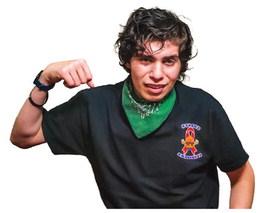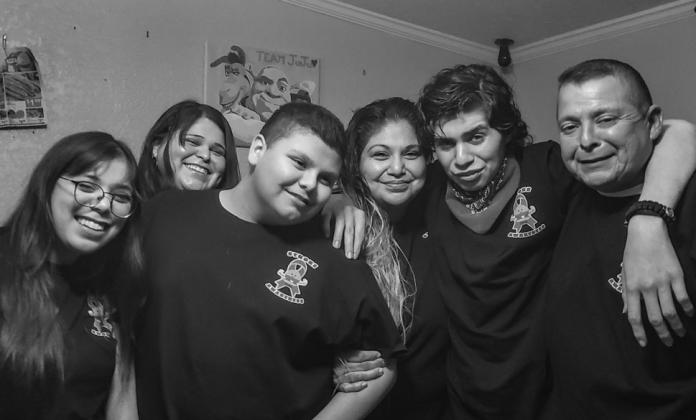Giving Up Was Never an Option
The Inspiring Story of Ricky De La Fuente, AKA Juju
How did a Bandera County resident amass 84.1 thousand TikTok followers from around the world?
His videos aren’t stereotypical internet snippets displaying vanity, coercing challenges or leading viewers down rabbit holes.
Richard De La Fuente, Jr, Juju to his family and friends, gained huge popularity on the video-sharing app by chronicling his traumatic injury and subsequent recovery from multiple brainstem strokes – all at the age of 19.
As relayed by Juju’s father, Richard, after an ordinary workday on April 16, 2021, Juju complained of a headache and eye pain.
Soon after, he developed slurred speech, disorientation and unsteadiness.
With the aid of his family, he attempted to walk but could not, and his body gave way. Eventually, he became unresponsive as EMTs arrived.
After working on him for about an hour, they could not determine what had happened to Juju, intubated him and took him to Santa Rosa Hospital in Antonio. There, the doctor said he may have had a brain aneurism and transferred him to the nearby St. Luke’s Baptist
Hospital. After specialists examined Juju, the family was told Juju had a stroke and due to a brain that had swelled more over the course of the day, there was no chance of survival. The brain surgeon explained they could relieve the pressure on the brain with an incision in the back of the head, but that Juju would likely not come of the surgery.
“Well what are you waiting for?” said Richard. “That’s my son; do something now, whatever you have to do to save him.”
Juju went into surgery while family and friends prayed fervently.
“We had a prayer chain,” recalled Juju’s mother, Jacqueline.
About four hours later, the surgeon announced the surgery went well but they were not out of the woods yet; they did not know how much damage had been done.
“But my son is still alive. I’ll take it. That means he’s fighting,” Richard said.
A group of brain surgeons explained Juju had suffered multiple strokes in his brainstem in the upper, middle and lower sections. They asked the family to truly consider letting Juju go because he would never eat, never hear their voices and was brain dead with a shell for a body.
The day after Juju’s surgery, sisters Katrina and Arielle set up video on a phone in Juju’s room so family could talk to him constantly and so Juju could hear typical sounds of their home routines.
From the time they put it up on August 17 to his discharge date, that video kept running.
After Juju entered St. Luke’s, he tested positive for COVID-19. He had tested negative upon arrival.
A few days later, Juju’s temperature spiked to a dangerous 104.5 degrees.
Richard said the head nurse told him to call his wife because Juju, whose brain was “boiling,” was not going to make it.
Richard said he pleaded for a doctor, a cooling blanket, some Tylenol, even a fan – all of which Richard says he was denied.
Finally, after asking for some ice, the nurse brought him a bag of ice, which Richard applied to Juju’s neck and head, running back and forth to the sink to grab more ice and then cool water after all the ice melted.
He did this for two hours until he saw the doctor come in for the morning shift.
Richard explained what was occurring with Juju. The doctor told him Juju was in bad, bad shape and explained the location of the stroke was the worst place possible.
Richard said he begged the doctor on his knees, “Please, please help me.” Within 15 minutes, Juju had a cooling blanket and his temperature was stabilized.
The doctors again assembled the family into a room to confer about Juju. Brain and spine specialists said nothing would recover. The respiratory doctor said he only had half a lung, the other shut down by COVID. They asked the family again to disconnect the ventilator.
Richard told the doctors, “My son is going to wake up, and he’s going to shake your hand.”
The family emphasized they are stubborn, but in the best possible way.
It’s likely Richard began to come out of his coma during the last week of August. According to the family, it is difficult to determine when Juju definitively came out of his coma because they kept medically inducing his coma with Propofol.
“We started to notice that he kept moving his toes just a bit and eyes and blinking, but then nurses would shoot IV propofol in his veins to put him back in a coma,” said Richard.
Richard asked staff to stop administering the drug, which they did. The doctors told the family his movements were all involuntary. However, they soon discovered Juju was in a Locked-In Syndrome, a rare disorder where one has total paralysis but retains consciousness and normal cognitive abilities. The family started communicating with Juju through “eye codes” and blinking. After this incident, the family monitored and questioned every single medicine on his schedule. With the help of a “miracle drug” by Dr. Park, who had given Juju his cooling blanket, Juju slowly slipped out of his coma. Dr. Park said he was going to start treating Juju like a patient who bumped his head and started him on a vitamin regimen. According to the family, naysayer specialists and a new caseworker emphasized Juju should be transferred to hospice or to a long-term care facility until he passed away.
Richard said he was adamant Juju would be going home with the family. “I’ll do what I have to do,” said Richard after he was told he could not care for Juju. The family continued to work with Juju in the hospital. Around June 16, his first word was “mama.” On August 13, 2021, Juju’s family took him home, where his real therapy began. Juju, homeschooled since the age of eight, was always by his father’s side. At the age of 18, he opened his own business as a licensed contractor in San Antonio. He owned his own home and had a new truck before the stroke debilitated him. Juju never smoked, drank, or even had a girlfriend. He was 100 percent dedicated to his family and his work. The close bond is apparent, as they immediately jumped into action with Juju’s care. Richard quit his job to dedicate his time to work on Juju’s physical therapy.
Juju’s brothers, Paul and Mike, also help with the therapy. Jacqueline takes care of his vitamins and food, and his sisters manage the communication and media.
The family dubs their effort officially as TEAM JUJU. While Juju was going through consistent and intense therapy, the family found Dr. Tobinick; based in Florida, he treats stroke patients with Etanercept, an anti-inflammatory drug he says improves motor function, cognition, spasticity and pain.
On December 3, 2021, Juju received his first treatment of Etanercept.
That night, Juju stood up for the first time. He became more consistent with his leg and arm movements, and his speech became clearer. He got off the feeding machine then slowly accepted and tolerated regular blended food. He slowly regained sensory in his organs. His eyesight improved.
By mid-January, he was completely off oxygen.
With the family’s assistance, Juju created his Tik-Tok account on December 28. His desire was to spread awareness about strokes, show there are resources available, document his journey and emulate never giving up.
People in similar situations were inspired by Juju’s recovery, his attitude and charisma. Juju gained an international following that included people from Malaysia, the United Kingdom, Africa, Russia and Japan.
His fans not only cheered him on; many sent money, support and even promotional items bearing the Team Juju branding.
This group was instrumental in helping raise funds for Juju’s medical supplies and equipment for his therapy, clothes and medicine. They even helped raise money for Juju to get his second and third Etanercept shots.
After his second shot on June 21, 2022., Juju was able to drink liquids without aspirating, had increased balance and stability, and his coordination was increased. He had markedly clearer speech, his right side became stronger and he regained sensation on his affected side.
The family is diligent about making sure Juju gets doses of the drug, so he received his third shot last month, after which he was able to eat soft foods without aspirating. He also began to urinate on his own, improved his balance on the walker, and has increased core strength. He even has improved coordination in his legs and arms and has shown improvement from severe ataxia. Planning to get Ju back to Florida by February of 2023, the family understands they will have to raise money again. At $8,000 per shot plus lodgings, the stakes are high.
For many TikTok followers and beyond, the De La Fuente family is an example of dedication, persistence, hard work, devotion, and steadfastness – and a remarkable love story.
To follow Team Juju, go to TeamJuju2021 on Tik-Tok or TeamJuju2021 on YouTube.
To contact the family, email them at teamjujuDLF@ gmail.com.
Juju told the Bulletin, “I’m taking my life back one step at a time. My goal is to get back to work and do what I love to do.”


